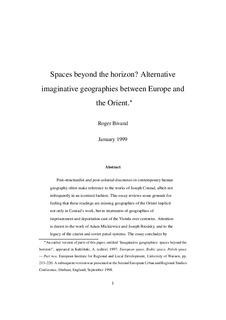| dc.contributor.author | Bivand, Roger S. | |
| dc.date.accessioned | 2008-12-17T09:03:26Z | |
| dc.date.available | 2008-12-17T09:03:26Z | |
| dc.date.issued | 1999 | |
| dc.identifier.issn | 1503-2701 | |
| dc.identifier.uri | http://hdl.handle.net/11250/162348 | |
| dc.description.abstract | Post-structuralist and post-colonial discourses in contemporary human
geography often make reference to the works of Joseph Conrad, albeit not
infrequently in an iconized fashion. This essay reviews some grounds for
feeling that these readings are missing geographies of the Orient implicit
not only in Conrad’s work, but in treatments of geographies of
imprisonment and deportation east of the Vistula over centuries. Attention
is drawn to the work of Adam Mickiewicz and Joseph Brodsky, and to the
legacy of the czarist and soviet penal systems. The essay concludes by pointing to the contribution that broader, alternative views of empire and
oppression may make in adding depth to our discourse. | en |
| dc.language.iso | eng | en |
| dc.publisher | University of Bergen. Department of Geography | en |
| dc.relation.ispartofseries | Geografi i Bergen | en |
| dc.relation.ispartofseries | 220 | en |
| dc.title | Spaces beyond the horizon? Alternative imaginative geographies between Europe and the Orient | en |
| dc.type | Research report | en |
| dc.subject.nsi | VDP::Samfunnsvitenskap: 200::Samfunnsgeografi: 290 | en |
